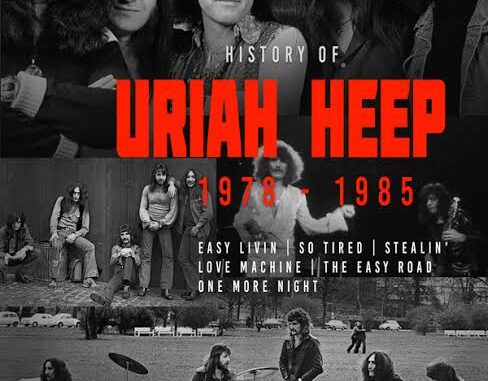
The Evolution of Uriah Heep: A Journey Through Rock History
Uriah Heep, one of the most enduring and influential bands in the history of hard rock and progressive rock, has traversed a remarkable journey since their formation in the late 1960s. Known for their distinctive blend of heavy riffs, melodic harmonies, and theatrical vocals, Uriah Heep’s evolution reflects both their adaptability and their steadfast dedication to their musical vision.
Origins and Formation (Late 1960s)
Uriah Heep was formed in London in 1969, initially conceived as a band that could blend the heavy sounds of Led Zeppelin with the theatricality of Deep Purple and the progressive elements of King Crimson. The founding members included Mick Box (guitar), David Byron (vocals), Ken Hensley (keyboards and guitar), Paul Newton (bass), and Lee Kerslake (drums). Originally, the band was named “The Spice,” but they soon settled on “Uriah Heep,” inspired by Charles Dickens’ novel David Copperfield, where Uriah Heep is a manipulative, scheming character.
Their early sound was characterized by a powerful combination of blues-based riffs, intricate keyboard arrangements, and Byron’s charismatic vocals. This period set the foundation for what would become their signature style: a fusion of hard rock with a touch of progressive and theatrical sensibilities.
Breakthrough and Classic Era (1970s)
Uriah Heep’s debut album, Very ‘Eavy… Very ‘Umble (1970), introduced the world to their energetic sound and theatrical stage presence. The album received mixed reviews but laid the groundwork for their subsequent success. Their second album, Salisbury (1971), marked a notable shift towards more ambitious, progressive compositions, exemplified by the title track’s epic length and complex arrangements.
The band’s third album, Look at Yourself (1971), solidified their reputation with hit songs like “Lady in Black,” which became a signature track and a staple of their live performances. The mid-1970s saw the release of their most commercially successful albums: Demons and Wizards (1972), The Magician’s Birthday (1972), and Sweet Freedom (1973). These records showcased a maturation of their sound, blending heavy riffs, melodic hooks, and lyrical storytelling.
During this era, the lineup was relatively stable, with Mick Box, David Byron, Ken Hensley, Lee Kerslake, and John Wetton (bass) contributing to the band’s distinctive sound. The band’s theatricality and musical sophistication earned them a dedicated fanbase and critical acclaim.
Lineup Changes and Musical Shifts (Late 1970s)
As the 1970s progressed, Uriah Heep faced internal tensions and changing musical tastes. The rise of punk and new wave in the late 1970s challenged the band’s more elaborate style. Despite this, they continued to produce albums such as *Wonderworld* (1974) and *Return to Fantasy* (1975), which incorporated more melodic and accessible elements but also reflected the evolving landscape of rock music.
The departure of key members like David Byron in 1976 marked a significant turning point. Byron’s flamboyant personality and distinctive vocals had been a defining feature of the band’s early identity. His exit led to a period of instability, with multiple lineup changes and varying musical directions.
Transition and Resurgence (1980s)
The 1980s were a tumultuous decade for Uriah Heep. They experimented with different styles, including more polished, radio-friendly rock, as seen in albums like Conquest (1980) and Fallen Angel (1978). However, these records received mixed reviews, and the band struggled to recapture the critical and commercial heights of their earlier years.
Despite challenges, the band persisted, and Mick Box remained the steadfast core. The addition of new members such as John Sinclair (vocals), Bob Daisley (bass), and Lee Kerslake’s return helped stabilize the lineup. The release of Abominog (1982) marked a notable comeback, with a more straightforward, hard rock sound that resonated with 1980s audiences. The album was well-received, and songs like “Too Scared to Run” and “Hot Night in a Cold Town” became fan favorites.
Renewed Creativity and Lineup Stability (1990s-2000s)
The 1990s saw Uriah Heep embracing a mixture of their classic sound with contemporary influences. Albums like Different World (1991) and Sea of Light (1995) demonstrated their ability to stay relevant while maintaining their signature style. The band also celebrated their legacy through remastered editions, live recordings, and anniversary tours.
Throughout this period, the lineup stabilized with Mick Box as the consistent member, supported by various talented musicians. Their live performances remained energetic, and they continued to cultivate a loyal international fanbase. The band’s songwriting matured, often reflecting themes of fantasy, introspection, and resilience.
Modern Era and Legacy (2010s-Present)
In recent years, Uriah Heep has continued to produce new music, demonstrating their enduring creativity. Albums like *Wake the Sleeper* (2008), *Into the Wild* (2011), and *Living the Dream* (2018) showcase their ability to blend their classic sound with contemporary production techniques. Their live performances remain vibrant, and their influence is evident in countless bands that cite them as an inspiration.
The band’s legacy is characterized by their pioneering blend of heavy rock and progressive elements, their theatrical stage presence, and their resilience in a constantly evolving musical landscape. Their ability to adapt without losing sight of their core identity has cemented their status as rock legends.
Conclusion
Uriah Heep’s evolution reflects a band that has navigated the highs and lows of the music industry with passion and perseverance. From their early progressive and theatrical peak to their resilience through lineup changes and shifting musical trends, they have maintained a distinctive identity. Their influence can be seen across generations of rock musicians, and their extensive discography continues to inspire fans worldwide. As they move forward, Uriah Heep remains a testament to the enduring power of authentic, heartfelt rock music.
Leave a Reply